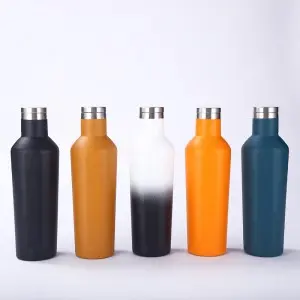Today we visited Professor Liao, the dean of the biology department of a well-known university, and asked him to explain to you from a professional perspective why the stainless steel water cups we use daily cannot and are not recommended to be used to hold juice drinks.
Hello everyone, I am Teacher Liao. Since I am not professional or authoritative about the functions of water cups, I will only briefly explain to you what may happen when stainless steel water cups are filled with juice from a biological perspective. Condition. I can only give you a reference. Everyone must have their own usage methods and habits in life. I hope my suggestions will be beneficial to everyone.
Although stainless steel is a widely used material, there are some important biological and chemical considerations when coming into contact with juice.
1. Reactivity: The main ingredients in stainless steel water cups are iron, chromium, nickel and other alloys. Juice contains acidic ingredients such as citric acid, malic acid and vitamin C. These acidic components may react chemically with the metal elements in the stainless steel, causing metal ions to leak into the juice. These metal ions can have harmful effects on the human body to some extent, especially for those who are allergic or sensitive to metals.
2. Impaired flavor: Stainless steel containers will not affect the taste or taste of juice. However, the leaching of metal ions may change the flavor of the juice, making it taste more metallic and less pure. This reduces the quality of the juice, making it not as good-tasting as it would be in a glass or plastic container.
3. Oxidation reaction: Certain components in the juice, such as antioxidants and vitamin C, may undergo oxidation reactions with the metal in the stainless steel cup. This reaction may reduce the nutritional value and antioxidant properties in the juice, thereby reducing the health benefits of the juice.
4. Maintenance difficulty: Stainless steel water bottles are usually more difficult to clean than containers made of other materials because the metal surface is prone to leaving stains and marks. The acidity of juice can accelerate oxidation and corrosion of metal surfaces, making cleaning more complicated. Improper cleaning can lead to bacterial growth, posing health risks.
Therefore, from my personal point of view, stainless steel water cups are not the best choice for holding all kinds of juices. To maintain the quality, taste and nutritional value of your juice, it is recommended to use glass, ceramic or food-grade plastic containers. These materials will not cause unwanted chemical reactions with the ingredients in the juice, ensuring that you can enjoy fresh, delicious and nutritious juice.
Post time: Feb-21-2024
